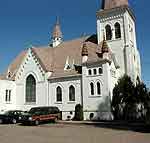By Dan Gunderson and Chris Julin
Minnesota Public Radio
July 29, 2002
| |
|
|
|
||
Dozens of people lined up for dinner on a recent day at a homeless shelter in Moorhead. They were waiting for a meal of hot dogs, french fries, beans and lettuce. The shelter director, Gary Groberg, says the number of people coming here has increased in the past couple of years.
Groberg has heard about poorfarms. Sometimes he wonders how much has changed.
"Things have kind of come full circle, unintentionally," he says. "I've got a shelter with people with mental illness, people with chemical dependency. I've got families with kids. I've got single women. I've got single men."
In the parking lot outside the shelter there's a picnic table. Three men sat at the table, soaking up the sun and listening to James Brown on a boombox.
Mike's been a self-employed construction worker most of his life, but he's been sick recently, and not able to work.
He's been at the shelter off and on for the past several weeks. He says the shelter is clean and the food's not bad, but he says people look at him funny if they know he lives here.
If he doesn't tell them he lives in the shelter, they treat him like anybody else.
| |
|
|
|
||
"Like if I walk out on a job site I'm in control - people talking to me and wondering this and that," Mike says. "You're here and you feel like a little whipped puppy, begging to go outside because you don't have the freedom to do what you want anymore at all."
One hundred years ago Mike might have lived in a poorhouse. And that's where he would have died.
Today you can still end up with nothing, and die unmourned. But these days you get your name on your grave.


